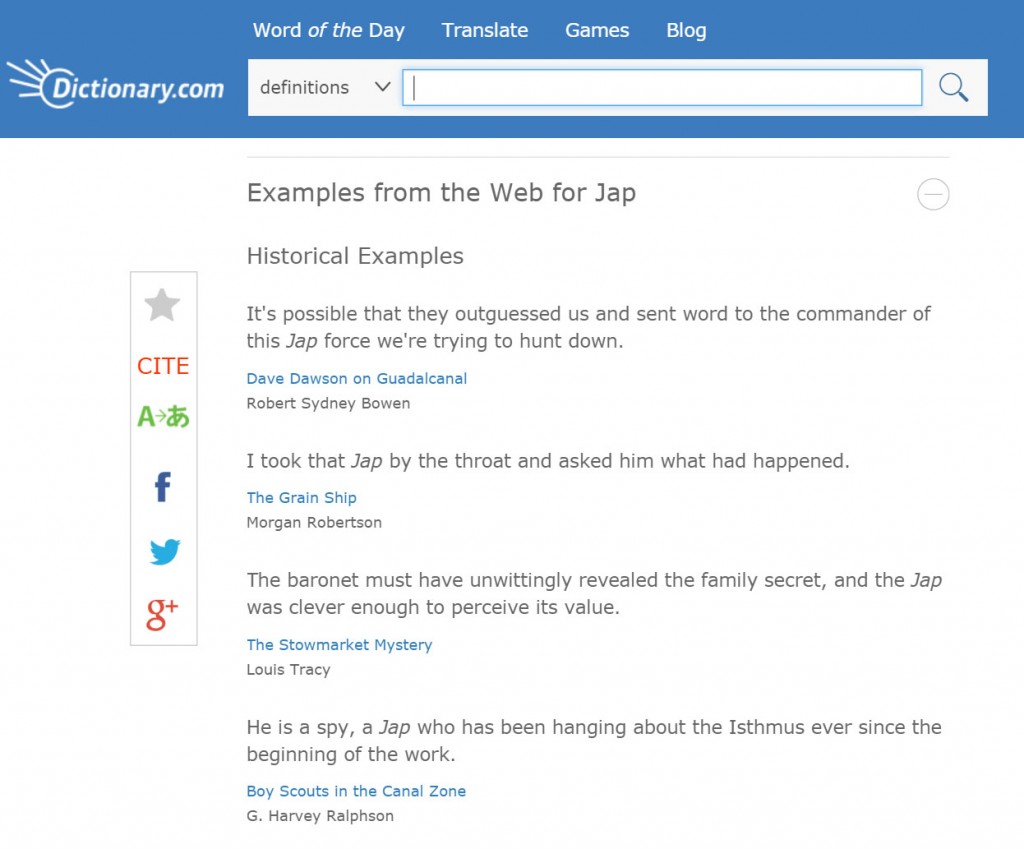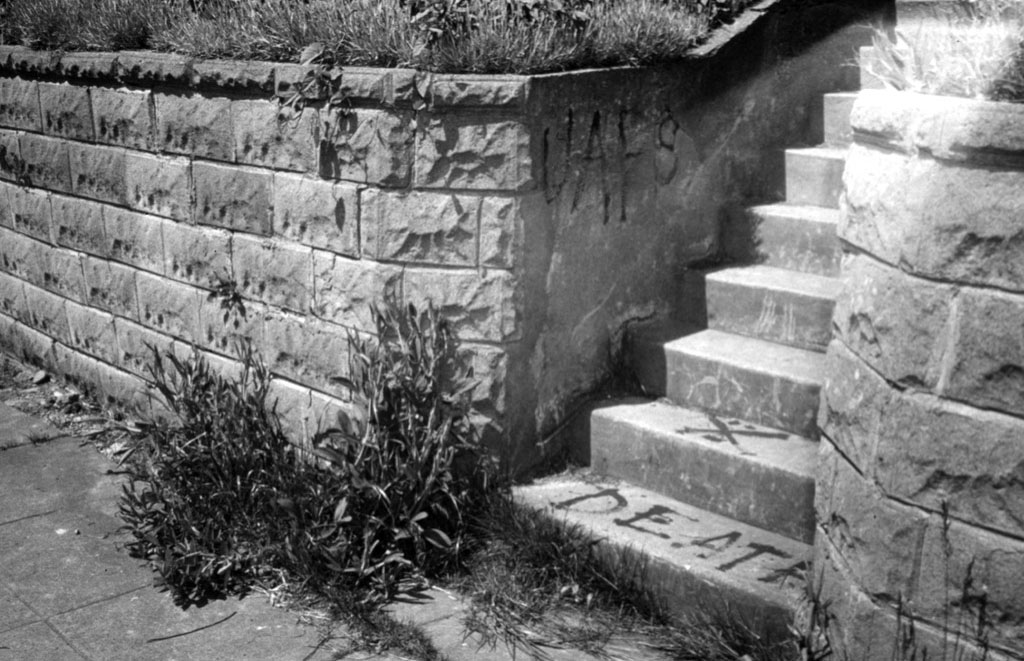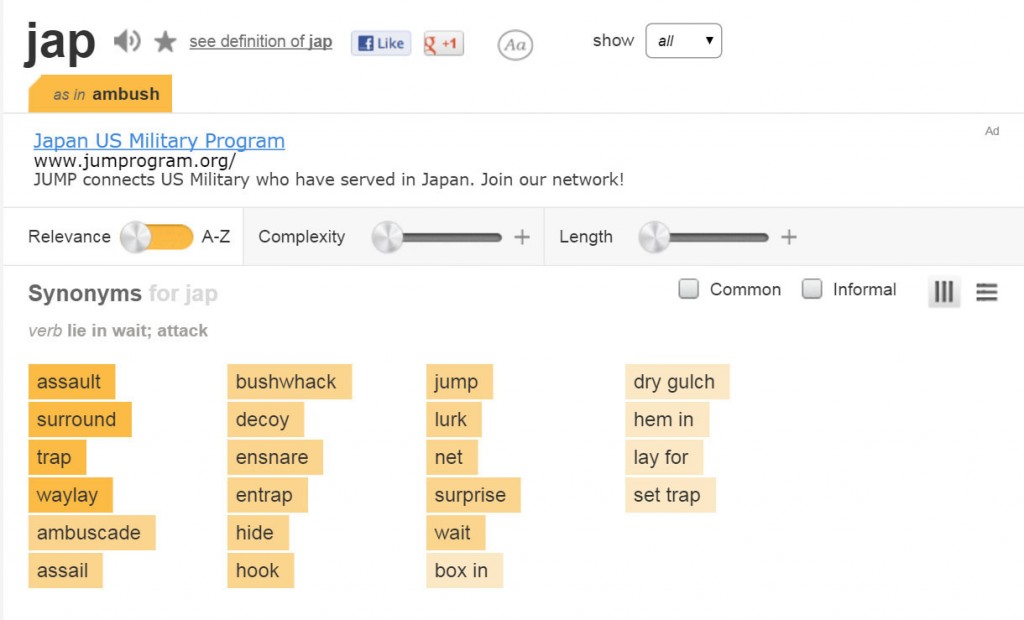January 21, 2016
 So you can imagine our surprise when a member of the Densho community brought to our attention the fact the popular reference sites, Dictionary.com and Thesaurus.com use the word with inconsistent acknowledgement of the fact that it’s a racist and derogatory term. Dictionary.com does note that the term is “Extremely Disparaging and Offensive,” but the accompanying usage note leaves much to be desired. It claims that this once-neutral term became racially charged during World War II “because the Japanese were the enemy.” There is no acknowledgement of the word’s history as a racial slur used against Japanese Americans during the charged era of mass incarceration, and for far too long in its aftermath. Even the historical examples provided by Dictionary.com (pictured at right) reproduce hateful characterizations of people of Japanese ancestry.
So you can imagine our surprise when a member of the Densho community brought to our attention the fact the popular reference sites, Dictionary.com and Thesaurus.com use the word with inconsistent acknowledgement of the fact that it’s a racist and derogatory term. Dictionary.com does note that the term is “Extremely Disparaging and Offensive,” but the accompanying usage note leaves much to be desired. It claims that this once-neutral term became racially charged during World War II “because the Japanese were the enemy.” There is no acknowledgement of the word’s history as a racial slur used against Japanese Americans during the charged era of mass incarceration, and for far too long in its aftermath. Even the historical examples provided by Dictionary.com (pictured at right) reproduce hateful characterizations of people of Japanese ancestry.
Click over to the sister site Thesaurus.com and things get worse. There, “jap” is listed as a verb meaning “to lie in wait; ambush” and is followed by a list of synonyms and antonyms (pictured below). Buried beneath the lists of synonyms and antonyms is the same inadequate usage note used on Dictionary.com. As if that’s not bad enough, “jap” appears as a suggested synonym for a number of other words and phrases: “box in,” “set trap,” “dry gulch.” In these suggestions, the word appears without any sort of usage note or any indication that it’s a problematic term. The entries give users the sense that it is OK to use the racial slur, as a verb, in everyday speech.
In early December, Densho contacted Dictionary.com/Thesaurus.com and asked that they discontinue the use of “jap” as a suggested synonym. We also asked that they publish a more strongly worded usage note (on par with how they treat other racial slurs), and develop the history section so that it included the term’s use as a racial slur against Japanese Americans. We received a prompt but unsatisfying response: “Additions made by our experienced lexicographic team are based on rigorous academic research and the definitions/content detail how language has been, and currently is, used by English speakers.” It has been over a month since our correspondence with the company and no changes have been made.
A survey of other online dictionaries shows a troubling trend: while the use of some racial slurs are strongly condemned, others, including “Jap” are given the lexicographic equivalent of a slap on the wrist. The usage notes and entries regularly fail to acknowledge the deep history of racism associated with the term. The Oxford Dictionary, for example, labels the word “informal, offensive,” and then proceeds to provide a list of words that rhyme with it. There is no usage note, no historical context, and no indication that the word is dated—a courtesy granted to other racial epithets. The Cambridge Dictionary excludes the word altogether, as though not acknowledging its existence might erase its charged history. We won’t even start with the layers of problematic definitions and examples that a search for “Jap” in the Urban Dictionary brings up but, trust us, it’s bad.
While many adults know not to use words like “Jap,” online dictionaries are used widely by students who need to be educated about the history and racist connotations of this word. The onus is on dictionary companies to treat racial epithets with the care and gravity they deserve so that this violent language is eliminated from the English vernacular. They need to do better.
RECOMMENDATIONS
The Free Dictionary includes a strongly worded warning not to use the word and we would like to see Dictionary.com, and all dictionaries, adjust their wording to something like what the Free Dictionary includes:
“This term is a slur and should be avoided. It is used with disparaging intent and is perceived as highly insulting.”
We also recommend:
- the addition of historical context indicating the word’s history as a Japanese American racial slur
- more strongly worded usage notes that advise people not to use the phrase
- the elimination of the word’s listing as a synonym
- the elimination of the historical examples that repeat the racist use of the word
We need you to help us get this message across! Please email Dictionary.com/Thesaurus.com (support@dictionary.zendesk.com), Tweet, and comment on the Dictionary.com Facebook page asking that they adopt the more sensitive treatment we’ve outlined above. Since our correspondence has been solely with Dictionary.com, we’re directing you to their contact information but encourage you to contact other dictionaries as well.
—
By Natasha Varner, Densho Communications Manager
Further reading: The fight against this racist term has a deep history. Follow this link to read about Shosuke Sasaki’s 20-year battle to eradicate “Jap” from print media. – https://gamset.net/
[Header photo: Racist graffiti on the steps of the S. Nagaishi family home, Seattle 1945.]

